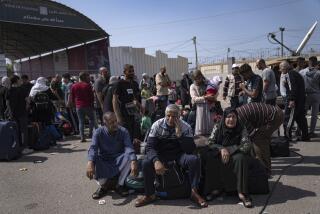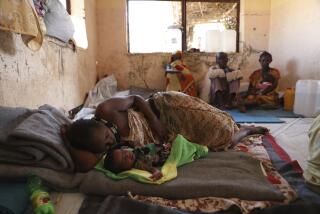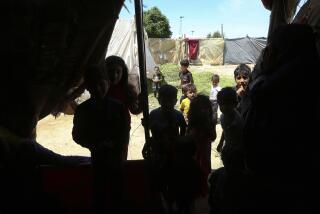Refugees From Kuwait Tell of Growing Panic
- Share via
KHAFJI, Saudi Arabia — A convoy of overloaded Mercedes-Benzes, BMWs and Chevrolets streamed across the border into Saudi Arabia on Sunday as thousands of Kuwaitis rushed for a newly opened border station amid a growing atmosphere of panic in the Kuwaiti capital.
An estimated 5,000 or more Kuwaiti refugees fled over the weekend in what officials here said appears to be a new effort by Iraqi President Saddam Hussein to drive Kuwaitis out of their homeland and establish an immovable Iraqi foothold in the embattled gulf sheikdom.
Kuwait’s government in exile, alarmed at the growing exodus and the atmosphere of terror that has prompted it, is considering a move to call for U.N.-sanctioned military intervention to check the crisis, according to diplomatic sources in the Saudi capital of Riyadh.
Residents fleeing Kuwait say Iraqi soldiers over the past several days have shot 21 Kuwaitis who refused to display a picture of the Iraqi president, gunned down 12 doctors for allegedly inadequate treatment of an Iraqi soldier and shot and killed several young Kuwaiti men at their homes in front of their parents.
“This is the kind of thing that some people call genocide, and if people wanted to construe it as such, it could be cause for some kind of military intervention,” said a Western diplomat in close contact with the Kuwaitis.
Military intervention “is not inconceivable at all to me if some of the things we’re hearing are true,” he said.
However, the Kuwaiti government in exile was noncommittal in its official statement, calling the Iraqi-inspired exodus “a new political game” designed to drive Kuwaitis out of the country and replace them with Iraqis. “Its aim is to get all of the Kuwaiti people out of Kuwait,” the government said.
Officials also fear that Iraq may use the refugee influx to plant terrorists inside Saudi Arabia, a scenario that kept refugees queued up at the border for hours Sunday as Saudi officials carefully searched their cars, including trunks and undercarriages, and pored over whatever personal documents they had remaining.
Because nearly all the Kuwaitis’ passports and other identification documents were confiscated by Iraqi soldiers at checkpoints near the border, a Kuwaiti committee was set up on the Saudi side of the border to interview incoming refugees and determine--by listening to accents and asking detailed questions about their families, jobs and backgrounds--whether they were true Kuwaitis.
Saudi officials for the past several weeks have feared that Iraq is attempting to establish a large core group of Iraqis within Kuwait who hold Kuwaiti passports, a scenario that could allow Hussein to establish a pro-Iraqi government in Kuwait even if his troops are ultimately withdrawn.
“In another six months, you can dislodge Saddam Hussein out of Kuwait, but you won’t be able to get Kuwait back,” a Saudi official said in an interview before the weekend exodus began. “Six months from now, the emir (of Kuwait) can come back and the Kuwaitis say, ‘Hell no, we don’t want him.’ And most Kuwaitis saying this would be Iraqis, and guess who they would vote for?”
Diplomats and government officials said it is also likely that the Iraqis are seeking to cause problems for Saudi Arabia, which is already seeking to house an estimated 120,000 Kuwaiti refugees in hotels, apartments and temporary housing all over the kingdom. More than 80,000 refugees of other nationalities also fled into the kingdom before Iraqi soldiers slowed traffic at the border to a trickle.
The refugees who streamed across the border Sunday represented a broad cross section of the Kuwaiti middle class--merchants, business executives, management consultants and engineers, most of them traveling in upscale cars laden with stuffed suitcases, boxes of baby bottles and diapers and children hanging their heads out of back windows.
“Welcome America, welcome everybody in the world to help Kuwait. We ask God to let them help us,” declared a man who identified himself only as Jaber as he stepped out of his car in Saudi Arabia. “I have nothing there. Everything is finished. Better I come to Saudi Arabia to hold the gun. Better that than die there, an animal.”
Miriam Sharyan, who escaped with her brother, said Iraqi troops were breaking into private homes to steal food and had shot three Kuwaiti teen-age boys in her neighborhood.
“It’s horrible. You can’t believe it,” she said, breaking into tears. “They are animals inside, not soldiers.”
Nearly all the Kuwaitis said their passports had been confiscated, but some said Iraqi soldiers appeared to be encouraging them to leave. “When anybody asked them on the border if they can go out, the Iraqi soldiers say, ‘Yes, you can go. We prefer you get your family outside.’ They want all of the families out,” said one refugee.
“I think they want to change everything to Iraqi,” said Hamad al Jariba, a Kuwaiti Airlines employee. “They want to remove all the Kuwaitis and move Iraqis in and tell the world, ‘Now see how Kuwait is happy.’ ”
Saudi officials said 1,800 Kuwaitis had crossed the border by Saturday night, and diplomatic sources in Riyadh said that as many as 5,000 to 8,000 had crossed the border over the weekend. It was not known how long the border would remain open. Some of the refugees camped out near their cars in Khafji, but most appeared to be driving on to Dhahran or Riyadh.
Western officials said they are still investigating reports of atrocities in Kuwait and added that many appeared to be well-documented and supported by enough eyewitness accounts that they could be considered true.
In one case, refugees reported that incubators for premature babies were confiscated by Iraqi troops and the babies inside were piled on the floor and left to die. In another, a number of refugees and Kuwaiti resistance leaders reported that Iraqi soldiers broke into a traditional gathering of Kuwaiti men Friday night and shot to death 21 people who refused to put up a poster of Hussein.
Western, Saudi and Kuwaiti government officials say they have received reports, corroborated by interviews with refugees in Khafji, that Iraqi soldiers had taken five young Kuwaiti men into custody, tied their hands and then took them to the doorsteps of their parents.
“When the parents answered, they said, ‘Is this your son?’ They shot him on the spot and left his body on the doorstep,” one official said.
At the border Sunday, there was an air of frustration at diplomatic efforts to resolve the crisis. Some refugees talked of seeing their families safely into Saudi Arabia, then going back to join the resistance.
A man who identified himself only as Abdullah began yelling as his family pulled him toward the desk where entry documents were being examined. “We need your help!” he shouted at reporters. “Please! Without American and European help, Kuwait will go. Arab will not help us. Never. Never, never, never. Please.”
More to Read
Sign up for Essential California
The most important California stories and recommendations in your inbox every morning.
You may occasionally receive promotional content from the Los Angeles Times.










